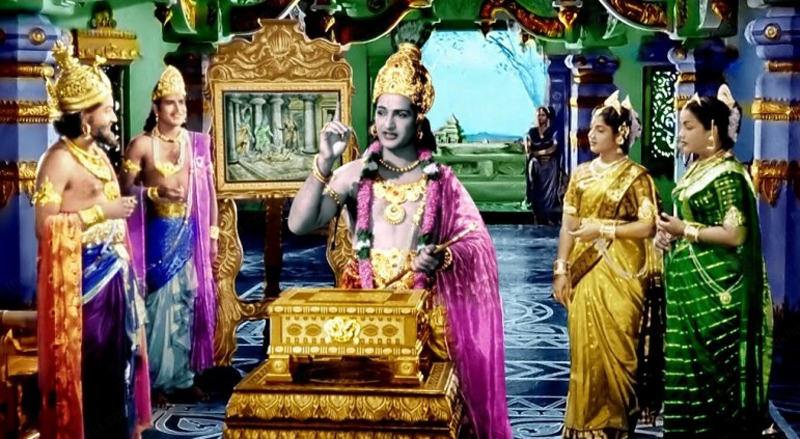The male vocalist in Dheera Dheera, a composer whose name is M.M. Keeravani, has an abundant repertoire of hits that span decades. If you find yourself turning into a super fan after a few listens, keep in mind that he performs in the Bay Area once or twice a year. So set that Google alert!
Maghadheera is a great example of a recent blockbuster in Tollywood, but the classics of any genre are its bread and butter. Maya Bazaar, produced in 1957 in both Telugu and Tamil, is a comedy revolving around characters from the Hindu epic, the Mahabharata, which plays out like Shakespeare’s Twelfth Night, complete with elements of gender bending. (Full disclosure: I’ve actually never read Twelfth Night, but I did see She’s the Man. Classic Bynes, classic Shakespeare: it’s all the same really).
In the scene below, the actress, Savitri, portrays Balarama’s daughter who has been purposefully taken over by the spirit of her male cousin to aid in her attempt at sabotaging her upcoming nuptials. While the English subtitles are not available on YouTube, in the loose translation of the lyrics provided by my husband, “Balarama’s daughter is basically saying, ‘My wedding’s going to be fabulous and there’s going to be a shitload of food.’”
Even for those who cannot speak Telugu, the acting, in particular Savriti’s facial expressions, show how comedy can transcend language barriers and cultures. Plus, if you’ve ever tried reading English translations of the Mahabharata, then you know watching this will prove to be the more enjoyable experience.
If you don’t like bells and whistles with your films and prefer the more realistic, then you may want to check out Swati Mutyam, a drama from 1986 that is the only Telugu film to be entered by India as Best Foreign Language Film for the Academy Awards. It’s your classic village love story, replete with a symbolic tulsi plant as powerful as the denim jacket hanging in Ennis Del Mar’s trailer home. The following clip is not a showstopper, but the song is beautiful nonetheless:
The last stop on our introduction to Tollywood is A-aa, a romantic-comedy that came out this past summer. With my mother-in-law visiting for the past three months, we spent a lot of time at the Century Theaters in Union City, which, surprisingly enough, sounds and smells like a cinema in Hyderabad (let’s just say that everyone snuck in a lot of home-cooked, non-theater food).
I could best describe A-aa as the Tollywood equivalent of How to Lose a Guy in Ten Days, or some other estrogen-rich rom-com starring Kate Hudson or Katherine Heigl, that’s completely forgettable, yet totally hits the spot on a rainy Sunday afternoon. A-aa centers around a self-absorbed city dweller who goes to stay with her cousin in the village and falls for him, which is socially acceptable in India:
Apart from the obvious entertainment value of these movies, watching foreign films opens us up to a new culture and language that we might not otherwise experience. They allow us to see the world from a different vantage point. Through film, the world becomes smaller and our mutual understanding of one another broadens, even if it’s just sharing a silly Tollywood film with your mother-in-law.


